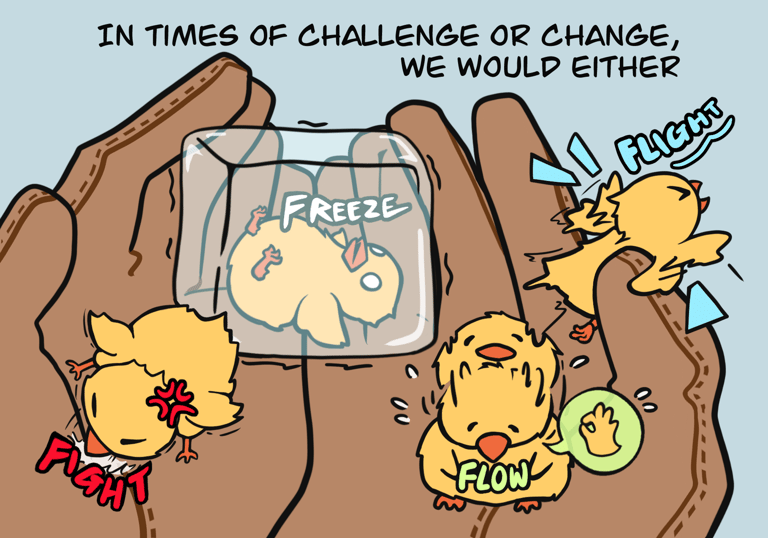Reacting to Challenge and Change: Fight, Flight, Freeze, or Flow
FOUNDATIONAL CONCEPTS


When faced with significant challenge or change, individuals typically enter a new change curve and respond in one of four distinct ways: fight, flight, freeze, or flow. Each response mode is driven by unique psychological mechanisms and manifests in varied behavioral patterns.
The "fight" response is characterized by confronting the challenge head-on. This often involves a surge of aggression or assertiveness, where an individual actively engages with the problem, seeking to overcome it. This response is underpinned by the activation of the sympathetic nervous system, leading to heightened arousal and readiness to tackle the issue. Those who employ the fight response may exhibit traits such as resilience, determination, and a proactive stance towards obstacles.
In contrast, the "flight" response entails avoiding the situation altogether. This can manifest as physical withdrawal or mental escapism, where the individual seeks to distance themselves from the stressor. The underlying psychology involves a perceived threat that feels insurmountable, prompting a retreat to safety. Individuals who frequently resort to the flight response may experience feelings of anxiety and a strong desire to evade discomfort.
The "freeze" response is marked by a paralysis of action. In this state, individuals feel stuck and unable to move forward, often experiencing a sense of helplessness. This response is typically triggered when the brain perceives a challenge as overwhelming, leading to a shutdown of active coping mechanisms. Those who freeze might find themselves immobilized by fear or uncertainty, struggling to make decisions or take action.
Lastly, the "flow" response involves a mechanism of appeasement, where the individual attempts to pacify or conform to a perceived threat. This often leads to heightened sensitivity to external demands and behavior patterns focused on meeting others' needs at the expense of personal well-being. Commonly observed in abusive situations, this response makes individuals feel a false sense of safety or security through avoiding conflict and being compliant.
Understanding these four responses—fight, flight, freeze, and flow—provides valuable insights into human behavior during times of challenge and change. Each response is influenced by an individual's self-esteem and perceived ability to navigate the situation, shaping how they ultimately confront or evade obstacles in their path.
At a deeper level, the four responses are underpinned by various defense mechanisms that serve as forms of psychological protection. As individuals navigate the complexities of challenges and changes, their self-esteem can be profoundly affected, often leading to the employment of various defense mechanisms as a form of psychological protection. Some examples of defense mechanism are: denial, projection, repression, rationalization, isolation, or identification. These mechanisms, while sometimes beneficial in the short term, can hinder personal growth and adaptation if over-relied upon. Understanding and identifying these defense mechanisms is crucial for fostering self-mastery and enhancing our ability to cope with change effectively.
The concept of self-mastery encompasses self-awareness, emotional regulation, commitment, and resilience. Self-awareness involves understanding one’s emotions and behaviors, providing a foundation for growth. Emotional regulation enables the control of emotional responses to various stimuli, promoting stability. Resilience, the ability to bounce back from adversity, is essential for enduring and overcoming challenges. Commitment involves dedicating oneself to personal goals and values, driving consistent effort and progress. Individuals with high levels of self-mastery are better equipped to recognize and manage their defense mechanisms, thus enhancing their adaptive capabilities.
The interplay between defense mechanisms and self-mastery is evident in how individuals handle challenges and changes. By cultivating self-mastery, individuals can reduce reliance on defense mechanisms and develop healthier coping strategies. This involves a continuous process of self-reflection, emotional management, and resilience building, ultimately leading to more effective adaptation and moving through the change curve.
So... Which F or defense mechanism you use to cope?
Product of JEM wayoflife
UEN: 53307176C
Contact Us
Want to join the HAY community?
© 2024. All rights reserved.
